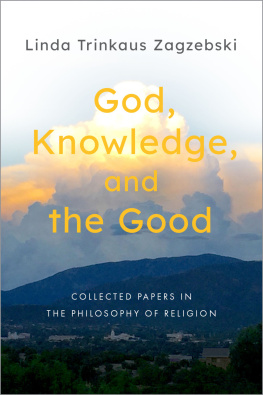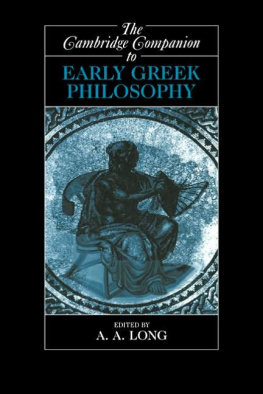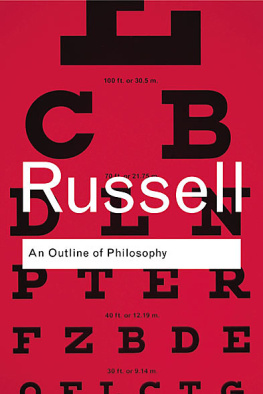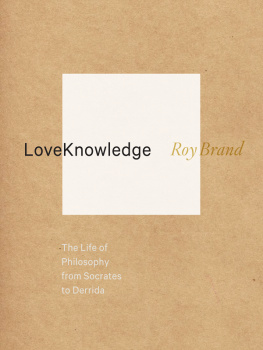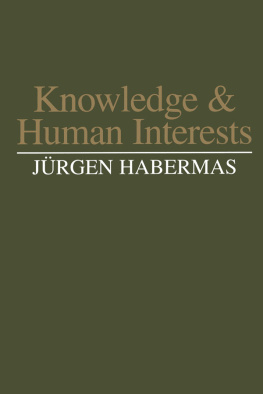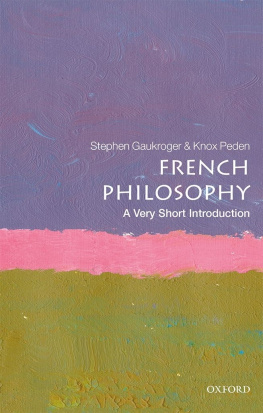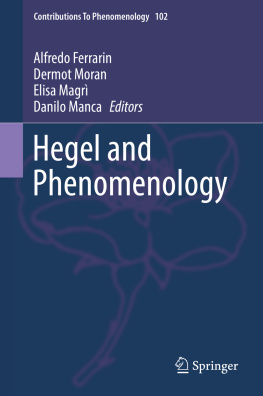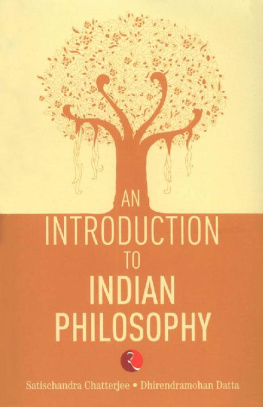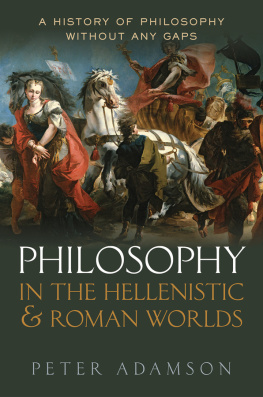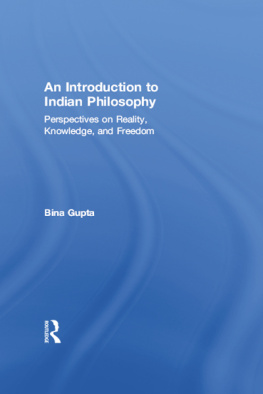Gaukroger - The philosophy of Knowledge : a history. Volume III, Knowledge in modern philosophy
Here you can read online Gaukroger - The philosophy of Knowledge : a history. Volume III, Knowledge in modern philosophy full text of the book (entire story) in english for free. Download pdf and epub, get meaning, cover and reviews about this ebook. year: 2019, publisher: Bloomsbury Academic. copyright 2019., genre: Religion. Description of the work, (preface) as well as reviews are available. Best literature library LitArk.com created for fans of good reading and offers a wide selection of genres:
Romance novel
Science fiction
Adventure
Detective
Science
History
Home and family
Prose
Art
Politics
Computer
Non-fiction
Religion
Business
Children
Humor
Choose a favorite category and find really read worthwhile books. Enjoy immersion in the world of imagination, feel the emotions of the characters or learn something new for yourself, make an fascinating discovery.

The philosophy of Knowledge : a history. Volume III, Knowledge in modern philosophy: summary, description and annotation
We offer to read an annotation, description, summary or preface (depends on what the author of the book "The philosophy of Knowledge : a history. Volume III, Knowledge in modern philosophy" wrote himself). If you haven't found the necessary information about the book — write in the comments, we will try to find it.
Gaukroger: author's other books
Who wrote The philosophy of Knowledge : a history. Volume III, Knowledge in modern philosophy? Find out the surname, the name of the author of the book and a list of all author's works by series.
The philosophy of Knowledge : a history. Volume III, Knowledge in modern philosophy — read online for free the complete book (whole text) full work
Below is the text of the book, divided by pages. System saving the place of the last page read, allows you to conveniently read the book "The philosophy of Knowledge : a history. Volume III, Knowledge in modern philosophy" online for free, without having to search again every time where you left off. Put a bookmark, and you can go to the page where you finished reading at any time.
Font size:
Interval:
Bookmark:

Knowledge in Modern Philosophy
The Philosophy of Knowledge: A History
General Editor, Stephen Hetherington
The Philosophy of Knowledge: A History is a tremendous achievement. Its four volumes cover the entire scope of Western epistemology, from the ancient world through the medieval and modern periods to the contemporary scene, with essays on the most influential figures in each of these periods. The result is a splendid overview on how fundamental questions about knowledge have been thought about over the millennia. These volumes will be the standard resource for all those interested in the history epistemology for decades to come.
Richard Foley, Professor of Philosophy, New York University, USA
This series of four volumes gives a reader the opportunity to take a fascinating voyage through the history of epistemology with an emphasis on the evolution of various theories of knowledge. The authors who contribute to the volumes are experts in their fields and the chapters in each volume are uniformly excellent.
Richard Fumerton, F. Wendell Miller Professor of Philosophy, University of Iowa, USA
This ambitious fourfold work aims to provide an overview of Western epistemology, from the Greeks through contributions on the contemporary scene... An invaluable resource on epistemological topics and on the development of Western thought about them.
Ernest Sosa, Board of Governors Professor of Philosophy, Rutgers University, USA
The Philosophy of Knowledge: A History presents the history of one of Western philosophys greatest challenges: understanding the nature of knowledge. Divided chronologically, these four volumes follow conceptions of knowledge that have been proposed, defended, replaced, and proposed anew by ancient, medieval, modern, and contemporary philosophers.
Each volume is centred around two key questions. What conceptions of knowledge have been offered? Which ones have shaped epistemology in particular and philosophy in general? Together, these volumes trace the historical development of knowledge for the first time.
Volume IKnowledge in Ancient Philosophy, edited by Nicholas D. Smith
Volume IIKnowledge in Medieval Philosophy, edited by Henrik Lagerlund
Volume IIIKnowledge in Modern Philosophy, edited by Stephen Gaukroger
Volume IVKnowledge in Contemporary Philosophy, edited by Stephen Hetherington and Markos Valaris

Contents
Peter R. Anstey (University of Sydney, Australia)
Stewart Duncan (University of Florida, USA)
Aaron Garrett (Boston University, USA)
Stephen Gaukroger (University of Sydney, Australia)
Antonia LoLordo (University of Virginia, USA)
Dean Moyar (Johns Hopkins University, USA)
Andrew Pyle (University of Bristol, UK)
Margaret Schabas (University of British Columbia, Canada)
Matthew Sharpe (Deakin University, Australia)
Justin E. H. Smith (University of Paris 7 Denis Diderot, France)
Anik Waldow (University of Sydney, Australia)
John Zammito (Rice University, USA)
The Philosophy of Knowledge: Introduction to a History
Welcome to philosophy to part of it, at any rate. A powerful and pivotal part of it, though: epistemology. Welcome to this survey a tour, across four volumes of a significant segment of epistemologys history. Western philosophy began in ancient Greece, before travelling far afield, still prospering. And whatever it is now is at least partly a consequence of whatever it has been. Within these four volumes, we meet much of whatever epistemology has been and is.
Why is this form of historical engagement philosophically important? Why is it important now to have some understanding of what epistemology has been? One reason is the possibility of current epistemologys being more similar to some or all of its former selves than it might at first seem to be, in productive and destructive ways. We should not merely be reinventing the epistemological wheel; nor should we repeat past epistemological mistakes design flaws in earlier epistemological conveyances. To know epistemologys history is to know better what contemporary epistemology could be and perhaps should be and what it need not be and perhaps ought not to be.
Epistemology is usually said to be the philosophy of knowledge and of kindred phenomena. But what makes it the philosophy of such matters? Well, epistemology has long been a collective endeavour a gathering of individual efforts, by a plethora of epistemologists over oh-so-many years to understand the nature of knowledge and those kindred phenomena. (Some of those efforts even ask whether there is a phenomenon of knowledge in the first place.)
How does that collective endeavour take shape? A first a partial answer is that epistemology is ineliminably theoretical. It is one theory, another theory, yet more theories, and so on. And so it is theories linking with, and departing from, other theories. It is theories living, developing, dying, reproducing, influencing, succeeding, failing. It is new themes replacing old ones. It is old themes replacing new ones.
And these four volumes will introduce you to such theories competing conceptions of knowledge and those kindred phenomena, conceptions from across the ages. Volume I introduces us to theories from parts of the ancient world, the fount of all Western epistemology. Volumes II and III trace theories of knowledge as these arose over the following two millennia, late into the nineteenth century. Volume IV then tells a tale of the past century or so while gesturing also at how epistemology might continue into at least the near future, taking us there from here. Not all of epistemologys past or present theorists and theories appear in these pages; but many do. The result is a grand story of sweeping intellectual vistas with striking conceptual foundations and ramifications. It is living philosophy. It is here, with you right now.
Stephen Gaukroger
The study of the history of seventeenth- and eighteenth-century philosophy has been shaped by a standard historiographical template that is essentially Kantian-inspired. According to this template, philosophy underwent a long fallow period between classical antiquity and the early modern era, and was effectively reborn in the early seventeenth century. The rebirth changed the nature of philosophy, transforming it from metaphysics an account of what kinds of things there are in the world and how they are related into epistemology an enquiry into the sources of our knowledge. With this transformation, the basic fault line that shaped philosophy was no longer that between the competing metaphysical systems of Plato and Aristotle, but rather between two competing and mutually exclusive epistemologies: rationalism, which based all knowledge on truths of reason, and empiricism, which based all knowledge on sensation. On this reading, the process started with Descartes, the founder of rationalism, was challenged with the empiricism of Locke and then Hume, and finally came to be resolved in Kant; or Hegel, depending on the version of the story. Finally, there is another hiatus between Hegel and classical German idealism, in the early decades of the nineteenth century, and Freges revolution in philosophy at the end of the century, where epistemology becomes reformulated in terms of issues in the theory of meaning, and where, in a development of Kantian concerns about the standing of mathematical truths, problems in the philosophy of mathematics assume a central role.
Font size:
Interval:
Bookmark:
Similar books «The philosophy of Knowledge : a history. Volume III, Knowledge in modern philosophy»
Look at similar books to The philosophy of Knowledge : a history. Volume III, Knowledge in modern philosophy. We have selected literature similar in name and meaning in the hope of providing readers with more options to find new, interesting, not yet read works.
Discussion, reviews of the book The philosophy of Knowledge : a history. Volume III, Knowledge in modern philosophy and just readers' own opinions. Leave your comments, write what you think about the work, its meaning or the main characters. Specify what exactly you liked and what you didn't like, and why you think so.

